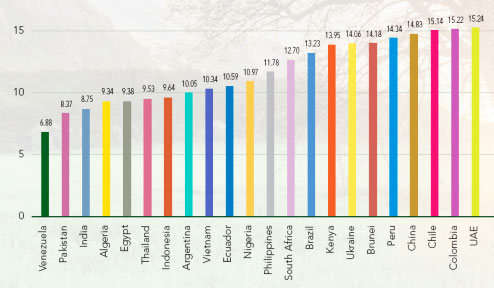Vietnam has climbed 2.51 points in the 2017 international intellectual property index, reflecting the country's intensified attention and improvement in the area.

The American Chamber of Commerce in Vietnam announced the 2017 International Intellectual Property (IP) Index, "The Roots of Innovation," late last week, the fifth edition since 2012.
The 2017 index found that Vietnam's overall score has climbed from the previous 7.83 out of 30 (26 per cent) to 10.34 out of 35 (30 per cent).
With the score, Vietnam was in the top five economies' average score. In comparison with other regional countries, Vietnam's score was higher than Thailand (9.53) and Indonesia (9.64), but lower than the Philippines (11.78), China (14.83), Malaysia (17.19), and Singapore (28.62).
"This increase reflects Vietnam's being a signatory to the Trans-Pacific Parnership and its moderate performance in some of the new indicators, including industrial design protection and the ability to commercialise IP assets," said Kelly Anderson, senior manager of the US chamber's International IP, Global IP Centre.
According to the newest index, Vietnam's key strengths are its solid basic IP framework, particularly for trademark protection, some improvement in protection of domain names, and legislation against confusingly similar marking for dissimilar goods, elementary framework for IP rights enforcement, with ex-officio customs authority, and greater recognition of and international cooperation in IP (for instance, local campaign Programme 168 and the EU-Vietnam Free Trade Agreement (FTA)).
Nevertheless, although 2016 saw greater governmental focus on IPs, overall efforts remain limited relative to the scale of the challenges and tend to occur on a case-by-case basis rather than on a large scale, she added.
Vietnam's weaker areas remain the inadequate protection of life sciences patents, with a challenging enforcement environment; gaps in copyright protection, including lack of measures to address online infringements; very high physical counterfeiting rates; and generally poor enforcement, insufficient penalties, and administrative inaction.
The 2017 index analysed that Vietnam’s joining a range of FTAs progressively raises the bar for IP standards.
For example, the EVFTA is expected to enter into force in 2018. IP provisions in chapter 12 tackle a number of the major holes in the current IP system. Among other elements, these include providing a two-year patent term extension, narrower exceptions to copyrights, and the revocation of bad-faith trademarks.
Since 2012, the US Chamber's international IP index has provided a valuable tool to gauge the global IP environment. The fifth edition offers a roadmap for policymakers and thought leaders to enhance their competitiveness through strong IP.
Economies are scored against six categories of IP protection: patents, copyrights, trademarks, trade secrets, and market access, enforcement, and ratification of international treaties. The 2017 index includes five new indicators to better capture an economy's overall IP environment in a continuously evolving digital age.
VIR